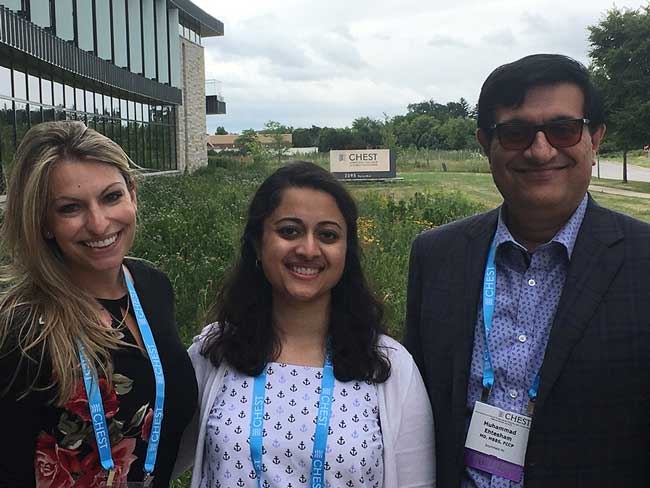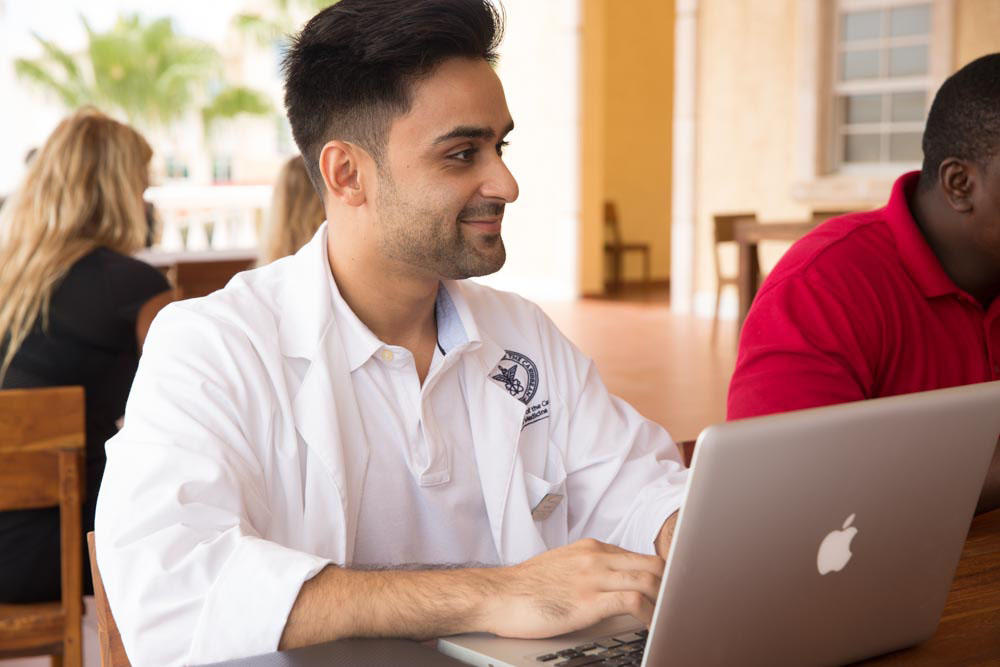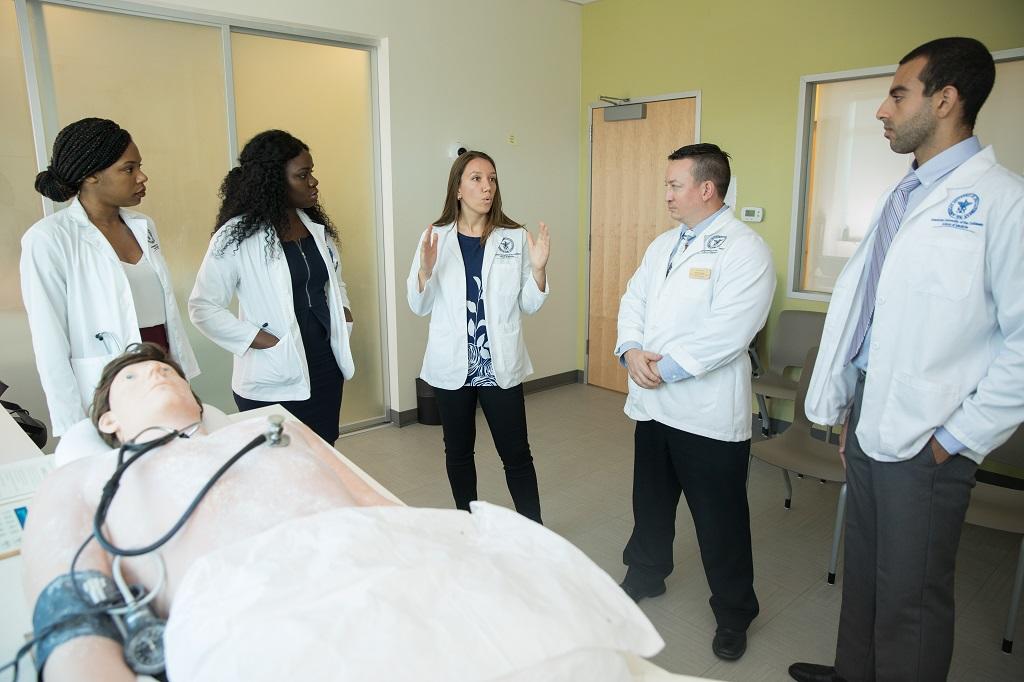
Dr. Priyanka Jain (center) with colleagues at the American College of Chest Physicians
Written by Priyanka Jain, MD (AUC Class of 2015)
Time is fleeting. This thought stays in my mind as I sit in my matchbox of an apartment under a bundle of blankets while my thermostat figures out how to work. This time one year ago I was four months away from finishing residency and now I am four months away from finishing my first year as a pulmonary/critical care fellow. It’s more than surreal – it’s almost unbelievable.
I clearly remember my very first day as a fellow. Wearing an oversized white coat and walking into a brand new hospital with a full ICU and one very sick ARDS patient in prone position, all I could think was ‘What do I do?’ Where was all the knowledge I gained from three years of residency? Or the confidence I had left with? Lucky for me (and the patient), with the help of an amazing nursing staff and one very understanding attending, we all survived Day One.
Starting fellowship is akin to starting internship. You are a stranger, navigating both a literal and metaphorical maze of a new hospital system and its EMR, cataloging the names and faces of colleagues and staff you meet as you keep adding PDF copies of articles and textbooks to your computer, promising to read everything you’re given – when in reality you’re just hoping for a few hours of sleep and a moment when your head manages to stay above water.
But fellowship is harder than internship and residency. And it’s supposed to be. As a resident, there is always a hand at your back, ready to catch you when you fall. Responsibility is gained in stages and the buck never stops with you. Once you finish residency, you know how to BE a doctor – you couldn’t have made it this far if you didn’t know that someone with septic shock needs fluids and antibiotics or that there’s a certain way to tell your patient that she has newly diagnosed breast cancer.
Once you start fellowship, there’s nothing special about knowing HOW to doctor – everyone knows that. If you’re just ordering tests because you know that’s the next step or blindly following attending orders, you might as well have stayed in residency. Being a fellow, or a specialist-in-training, is like being a member of a very exclusive club that only allows in those who are deemed worthy. You’re not doing justice to yourself or your colleagues if you don’t move past "just doing things because this is the way they are done."
Most importantly, you’re not doing justice to your patients. These are the lives that will be in your hands – don’t they deserve the care of someone who is constantly educating themselves and questioning the standard? Someone told me recently that fellowship is the time – it is the time to question, to learn, to experiment. It took me a little over six months to come to the same conclusion – but everyone moves at their own pace, right?
But I shouldn’t take all the credit for surviving almost a full year of fellowship. It’s been a team effort. For every moment that felt like a struggle, there were so many more instances that reminded me that while fellowship is about expanding your knowledge and learning to think critically, it’s also about carving pumpkins for the first time, leaning on each other, fighting over coveted coffeemakers and making people who make you nervous into friends.
I haven’t even finished my first year of fellowship but what I’ve already experienced is a small taste as to what the rest of my journey holds. I’d like to think that the mistakes I’ve made and the skills I’ve gained will be helpful to share with those of you who are about to start – and so I present to you…
What I’ve Learned in Fellowship (So Far)
- It’s okay to struggle. Like I said earlier, residency is over and done with. The most important thing is to realize that you are struggling and what you can do to change.
- As a continuation of above, lean on each other. This isn’t a competition anymore. You’ve all achieved your goal of becoming a fellow – now is the time to support each other.
- Question everything. Just because someone says it’s so, doesn’t make it so. You end up reading more and expanding your fund of knowledge – it can only benefit you.
- Look for opportunities when it comes to procedures. Now the buck does stop with you. There will be situations where the resident won’t be able to get the line or where anesthesia isn’t available. Here’s your chance – if you’re afraid, you’ve already lost.
- Research is a necessary evil – my personal opinion – but I will say this – it teaches you to think critically and that is something we should never stop learning.
- Get to know your co-fellows and attendings. As cheesy as it may sound, they truly are your family for the next three years. Families fight and they may disagree but at the end of the day, they are there to support you and help you become the best you can be.
- Above all else – HAVE FUN. This is what you wanted to do with the rest of your life – don’t make yourself regret it by getting mired in all the minutiae.
Now, when I walk into the hospital, I have on a white coat that fits me, I’ve stopped getting lost going to the ED, I’ve developed a rapport with other physicians and nurses and I read not because I was told to but because I want to answer a question. Most importantly, my head (and a lot more of me) is staying above water. Time may be fleeting but I can say, without a doubt, I have never been happier. I may have to pick a warmer apartment, though.
Priyanka Jain, MD graduated from AUC in 2015. She completed her internal medicine residency at St. Vincent Mercy Medical Center in Toledo, OH, and is currently completing a pulmonary critical care fellowship at Ascension Providence Hospital/Michigan State University in Southfield, MI. Follow her blog at medicinalmusingsblog.wordpress.com.




